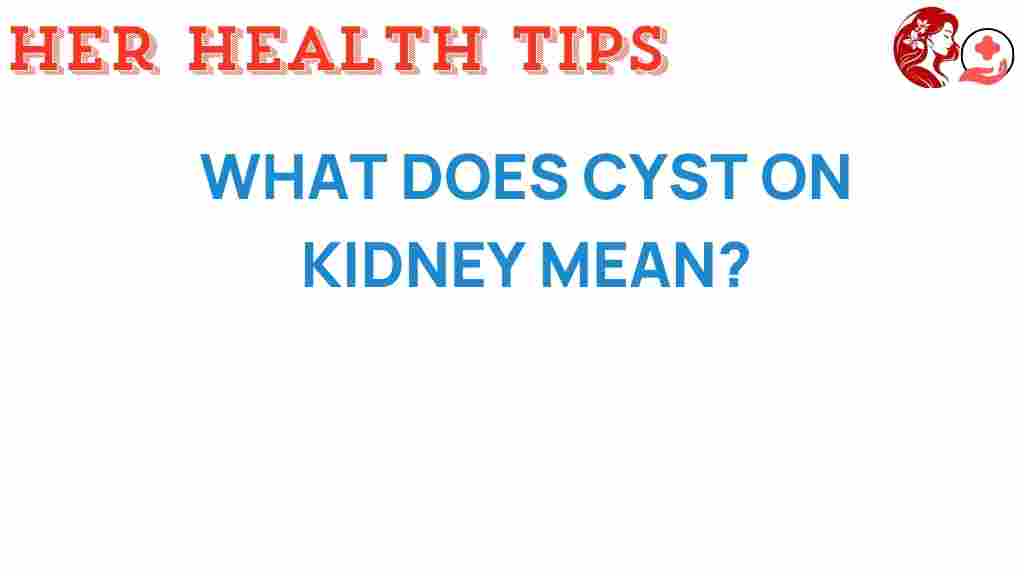Unraveling the Mystery: What a Cyst on the Kidney Really Means
Kidney cysts are fluid-filled sacs that form on or in the kidneys. While they are often benign and asymptomatic, understanding their implications is crucial for maintaining kidney health. This article delves into what kidney cysts are, how they are diagnosed, their symptoms, treatment options, and preventive measures to protect kidney function.
Understanding Kidney Cysts
Kidney cysts are common, especially as people age. They can range in size from a few millimeters to several centimeters. Most kidney cysts are simple cysts, which means they are typically harmless and do not require treatment. However, some cysts can be complex and may need further evaluation.
Types of Kidney Cysts
- Simple Kidney Cysts: These are fluid-filled sacs that usually do not cause symptoms and are benign.
- Complex Kidney Cysts: These may have solid components or calcifications and require further investigation to rule out malignancy.
- Polycystic Kidney Disease (PKD): A genetic disorder causing numerous cysts to form in the kidneys, potentially leading to kidney failure.
Diagnosis of Kidney Cysts
Diagnosing kidney cysts typically involves imaging studies. Here is a step-by-step process to understand how kidney cysts are diagnosed:
Step 1: Medical History and Symptoms Review
Your healthcare provider will first review your medical history and any symptoms you may be experiencing. Symptoms of kidney cysts can include:
- Flank pain or discomfort
- Blood in urine (hematuria)
- Frequent urinary tract infections
- High blood pressure
Step 2: Imaging Tests
If kidney cysts are suspected, your doctor may recommend imaging tests, which include:
- Ultrasound: A non-invasive test that uses sound waves to create images of the kidneys.
- CT Scan: Provides detailed images of the kidneys and can help differentiate between simple and complex cysts.
- MRI: May be used for further evaluation if needed, especially in complex cases.
Step 3: Further Evaluation
If a complex cyst is detected, your doctor may recommend additional tests, such as a biopsy, to gather more information about the cyst’s nature.
Symptoms of Kidney Cysts
While many kidney cysts are asymptomatic, some may present symptoms. Here are common symptoms associated with kidney cysts:
- Pain: Dull ache or sharp pain in the back or side.
- Blood in Urine: Can indicate a ruptured cyst or other complications.
- Frequent Urination: Especially at night.
- High Blood Pressure: Could be related to kidney function impairment.
Treatment Options for Kidney Cysts
The treatment for kidney cysts largely depends on their type and whether they are causing symptoms. Here are the common treatment options:
Observation
If the cyst is simple, small, and asymptomatic, your doctor may recommend regular monitoring through imaging tests. This is often the best approach to avoid unnecessary interventions.
Medications
If you experience symptoms like pain or high blood pressure, medications may be prescribed to manage these issues.
Surgical Intervention
In cases of complex cysts or those causing significant symptoms, surgical options may be considered:
- Drainage: A minimally invasive procedure to drain the cyst.
- Laparoscopic Surgery: A surgical procedure to remove the cyst, especially if it is suspected to be malignant.
Prevention of Kidney Cysts
While not all kidney cysts can be prevented, there are steps you can take to maintain kidney health and potentially reduce the risk:
- Stay Hydrated: Drink plenty of water to help your kidneys function efficiently.
- Manage Blood Pressure: Keep your blood pressure within a healthy range to protect kidney function.
- Maintain a Healthy Diet: Focus on a balanced diet rich in fruits, vegetables, and whole grains.
- Avoid Smoking: Smoking can negatively impact kidney health.
- Regular Check-ups: Routine medical check-ups can help detect kidney issues early.
Impact of Kidney Cysts on Kidney Function
Most simple kidney cysts do not affect kidney function. However, complex cysts or conditions like polycystic kidney disease can lead to a decline in kidney function over time. Monitoring and early diagnosis are crucial to managing kidney health effectively.
Medical Insights on Kidney Cysts
Research shows that kidney cysts are prevalent in adults over the age of 50, with estimates suggesting that up to 50% of individuals in this age group may have at least one kidney cyst. Understanding the nature of these cysts is vital for determining the appropriate management approach.
Medical professionals often emphasize the importance of imaging studies to differentiate between benign and potentially harmful cysts. Ongoing research continues to explore the genetic factors and lifestyle choices that may influence the development and progression of kidney cysts.
Consulting a Healthcare Professional
If you suspect you have a kidney cyst or experience symptoms, it is essential to consult a healthcare professional for proper diagnosis and treatment. Early intervention can prevent complications and maintain optimal kidney function.
Troubleshooting Tips for Kidney Cyst Concerns
If you have been diagnosed with a kidney cyst or are concerned about your kidney health, consider the following troubleshooting tips:
- Keep a Symptom Diary: Track any symptoms you experience and discuss them with your doctor during visits.
- Stay Informed: Educate yourself about kidney health and cysts. Reliable resources include medical websites and your healthcare provider.
- Follow Medical Advice: Adhere to your doctor’s recommendations regarding monitoring and treatment.
- Seek Second Opinions: If you’re uncertain about a diagnosis or treatment plan, don’t hesitate to seek another opinion.
Conclusion
In conclusion, kidney cysts are a common health issue that warrants understanding and attention. While most are benign and asymptomatic, some can lead to complications affecting kidney function. Regular monitoring, awareness of symptoms, and proactive health measures can help manage kidney health effectively. If you have any concerns about kidney cysts or your overall kidney health, consult a healthcare professional for personalized advice and treatment options.
For more information on kidney health and related topics, visit this resource.
Understanding the implications of a kidney cyst is essential for maintaining your health. Stay informed, stay healthy!
This article is in the category Conditions and created by HerHealthTips Team
